Wednesday Feb 25, 2026
Wednesday Feb 25, 2026
Tuesday, 18 February 2020 00:00 - - {{hitsCtrl.values.hits}}
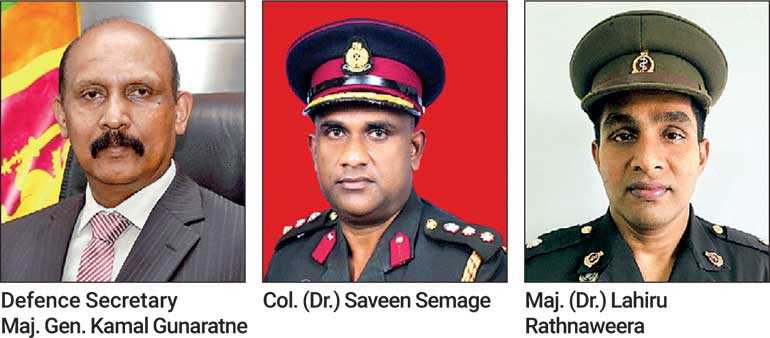


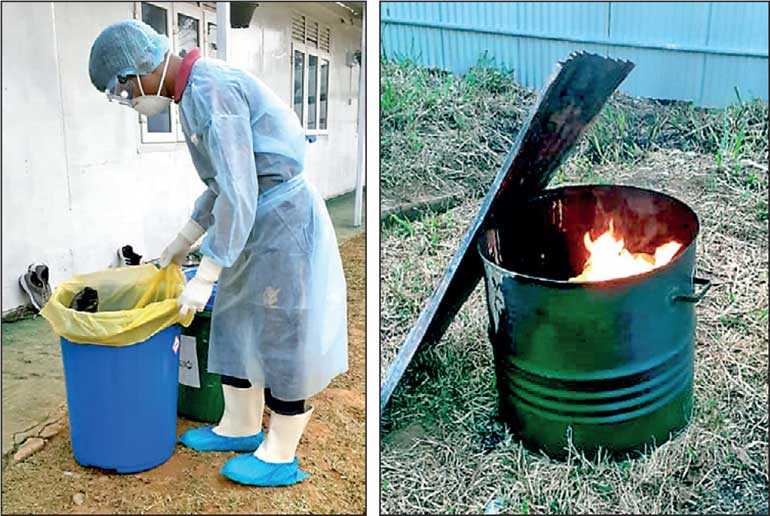
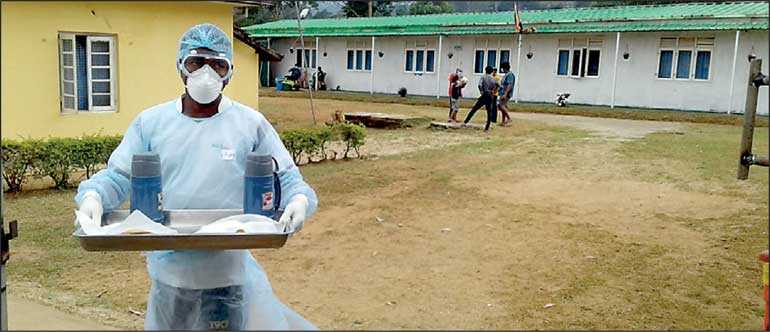
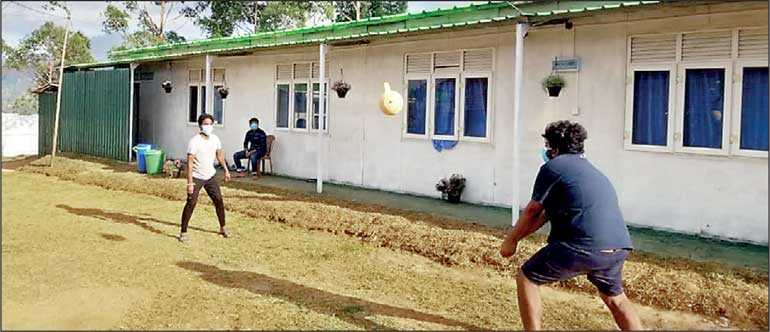
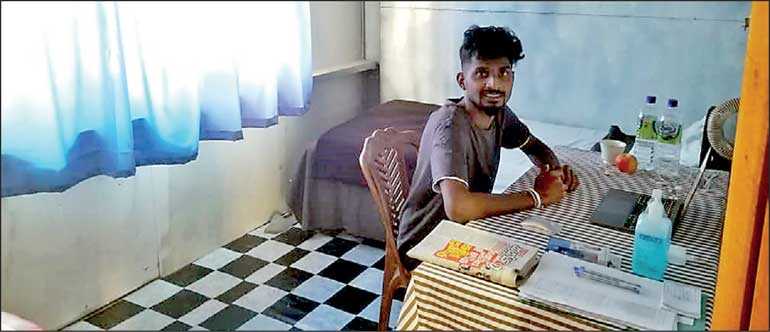
Defence.lk: “If you want to describe this place, it’s awesome,” Suganthan said. “I will tell all my friends and family that the hospitality and care we received here is beyond ‘star grades’. I have never ever been to a military facility before,” Suganthan continued to share his experience at the Diyatalawa Quarantine facility, which was set up by the Sri Lanka Army (SLA) to quarantine the group of Sri Lankans evacuated from coronavirus-hit Wuhan. 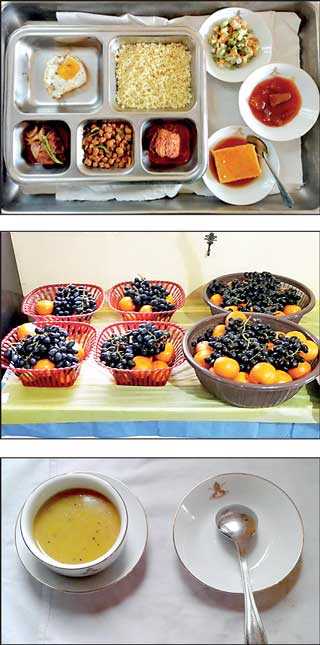
Suganthan, 37, an IT Manager by profession, was visiting his wife Gayamini for holidays before spending over a week trapped in her apartment at the university premises.
“We feel relieved, and want to pay gratitude for all those involved in making our passage back home possible,” Suganthan said commending the Government’s efforts to stand for them when they were trapped in the Wuhan Province, which was shut for the rest of the world to prevent the virus spreading to other provinces in China.
“The moment we realised the efforts of our Embassy officials in China, and the Government along with SriLankan Airlines and the military to bring us back home, we knew we were in good hands,” he said.
His wife Gayamini Gnanasuganthan was following her Masters in Computer Science and Engineering at the Wuhan University of Technology.
Hailing from Jaffna, Suganthan resides in Dehiwala and has completed his stay at the quarantine facility at Diyatalawa, where it was medically endorsed that he is free of the coronavirus.
Suganthan, had no clue of what he was about to endure. His visit to Wuhan had a twist which was beyond his expectations as suddenly towns and streets were becoming void of people. Wuhan officials had restricted movement in an effort to quell the spread of the viral pandemic.
“Luckily, we had enough groceries to sustain for 10 days,” Suganthan recalled.
When they arrived in the quarantine facility at Diyatalawa, Gnanasuganthan was surprised to see there was space even for recreational activities like playing badminton at the facility.
“There, we had to follow the required safety precautions spelled out in the quarantine process. I must confess, that I, my wife and all others are absolutely overwhelmed by the unprecedented warmth that the military has extended to us. I have never ever felt more proud of being a Sri Lankan as I do today. Indeed, we are a proud nation,” Suganthan said.
Exceptional caretaking and facilities
Kasun Wickramage, 28, was among the few students who had taken up social media to draw the attention of the officials back home of what was transpiring at Wuhan, the epicentre of the coronavirus outbreak.
Hailing from Gamakanda, a village 18 km off Embilipitiya, Wickramage had graduated from the University of Uva Wellassa.
He was following his Masters in Photogrammetry and Remote Sensing at the LIESMARS Wuhan University.
Now back in Sri Lanka, Wickramage was ready to leave the quarantine facility in the calm and cool environment that sheltered him and the rest of the returnees from Wuhan for the last 14 days.
He praised the military for foregoing an endeavour against unprecedented odds and at times scepticism from various interest groups back home.
“When we heard that the military was going to take care of us, we were all overjoyed. We knew about their exemplary conduct and professionalism, and that guarantee was itself sufficient. I won’t deny that a few of us were hurt to the core, when we learnt through local news channels and social media and some sections of the society have objected to the Government’s decision to charter us back home. Looking back into all that transpired during the past two weeks, I’m proud to be a Sri Lankan and as a nation we need to be proud of this very fact.
Here we experienced exceptional caretaking and the facilities provided are beyond our imagination,” he said.
He said that they were given all the facilities that one could hope for and the military had taken every endeavour to make the facility a home away from home for them.
“I must express my overwhelming gratitude to all behind this effort and the leadership provided at every level,” Wickramage, who was looking forward to joining with his family, said.
“I don’t deny and confess that whilst pursuing our academic endeavours back in China, we hardly knew each other.
Now following all the events that unfolded during the past few weeks and the time spent at the quarantine facility, we have found a new bond, made new and enduring friendships. There’s a silver line in every dark cloud,” he said.
“Lucky, but feel for others stranded”
“Indeed, I’m profoundly lucky to be back home, as the death toll has risen to over 1,300 and confirmed cases reported over 60,000,” Capt. Madhavi Perera of the SLA, who was following her PhD in biochemistry, at the Huazhong University of Science and Technology, said.
Prior to pursuing her PhD in China, she was a Lecturer at the Faculty of Engineering at the Kotelawala Defence University.
“There are no words to explain and express how the country’s leadership, the military, the Foreign Ministry and the Embassy officials rallied around to ensure that we would have a safe journey back to Sri Lanka. While feeling extremely lucky and privileged, I do fear for my foreign colleagues in Wuhan. They are being left to fend for themselves as some governments have either denied or had shown no hurry until now evacuating them from Wuhan. I talk to them over the phone to make them feel that we care for them,” she recalled.
Capt. Perera said some were sceptic about the 14-day quarantine process as some of her foreign friends, who had been evacuated, had bad experiences due to poor facilities in the centres that they were retained in for quarantine process.
“But, the Diyatalawa medical facility was made well-prepared and equipped to welcome and host us for the two-week-long quarantine process,” she said.
The Diyatalawa military facility was not new to Capt. Perera, who had her basic military training at Diyatalawa Military Academy in 2013.
Speaking on behalf of all her colleagues who underwent the quarantine process at the facility, Capt. Perera said everyone was grateful and lucky to be at Diyatalawa rather than elsewhere.
“It was like a heaven for us, who came with fear and that was what we all felt,” she said.
Capt. Perera thanked Defence Secretary Maj. Gen. (Retd) Kamal Gunaratne, Army Commander Lt. Gen. Shavendra Silva, Director Training of the Army, the Sri Lankan Defence Attaché and the Embassy officials in Beijing, and also to the Dean of the Faculty of Engineering at the Kotelawala Defence University for being in touch with them and encouraging them until they stepped into Sri Lanka.
Clear objectives and decision making vital for success
The Chief Coordinator of the entire quarantine process Col. (Dr.) Saveen Semage explaining how they got ready to welcome the group said two medical personnel, who had trained in responding to CBRNE risks and challenges, were handpicked and he personally believes the selection of the Diyatalawa army facility was ideal and the best decision taken to provide safety and also to carry out an effective quarantine process.
“There was a clear policy decision by the higher authorities to evacuate our students from the corona-hit Wuhan and to carry out quarantine process at Diyatalawa, which is an already functioning military base hospital located remotely,” SLA’s Deputy Director of Preventive Medicine Dr. Semage said spelling out three objectives of the mission: to prevent the virus spreading to other areas, to prevent and reduce the risk of contagion to SriLankan Airlines crew involved in bringing the group back to the country and to prevent and reduce the risk of contagion during the quarantine period among the evacuees.
Principle of reducing risk of contamination
“On their arrival to the Diyatalawa facility, the evacuees were given face masks and instructions to keep away from each other at all times. Every measure was taken to ensure reducing the risk of contagion.
There are four families including four children among them,” Maj. (Dr.) Lahiru Rathnaweera, who is the Officer Commanding at the Diyatalawa Military Base Hospital, said.
He said that even before the evacuees arrived at the facility, they established a chat group via social media, as an extended measure in reducing the risk of any proximate interactions during the quarantine period.
According to Dr. Rathnaweera, the evacuees were provided with digital thermometers to keep a count on their body temperatures and given instructions in the proper and accurate usage of the instruments. Thrice a day, their temperatures are being checked, facilitated via the chat group we had established as the basis was strict compliance towards reducing any possibility of contagion,” he said.
It’s our story; Uniquely Sri Lankan
Sri Lanka, despite being limited by her land scale has never been short of inspiring epic humanitarian efforts. More than any other nation in the 21st century, she had now and again proved her resilience as a nation and the will of her people.
Together they stood up against the 2004 Boxing Day tsunami devastation and was back and running dwarfing the Katrina hurricane relief efforts.
In 2009, its military performed a feat never before experienced anywhere in the world since the 1950 Hungnam evacuation during the Korean war. Sri Lankan armed forces rescued over 275,000 civilians held at gunpoint as human shields cum hostages by the LTTE, during the last phases of the conflict sensing its imminent military defeat.
The years 2016 and 2017 saw the island’s Western, Southern and Central provinces being ravaged by landslides and flash floods, which were further worsened by a dengue outbreak. Yet again Sri Lanka prevailed. Not by aid or grants but by the sheer humanity that her fellow citizens extended.
Following the 2018 Easter Sunday suicide bombing spree, many feared a repetition of the infamous Black July, this time against the minority secular Muslim communities. As resilient as they are, Sri Lanka’s Buddhists, Christians and Hindus were at the forefront to safeguard their fellow Muslims from any possible communal or religious spill over.
Proud of our Armed Forces
“I’ve no words to express my gratitude for our armed forces. They have treated us with exceptional hospitality,” Irshad Ibran Shahib said.
33-year-old Shahib from Horawpothana, was undergoing his Doctoral studies in Material Physics and Chemistry at the Huazhong University of Science and Technology.
He along with his four-year-old daughter Haya Maryam and wife Hishama, who have undergone quarantine process, thanked the Army for looking after them safely and giving them a homely feeling.
“Let me say that I and my family are really impressed by the professionalism, pragmatism and the nobility of our armed forces. I now feel like joining the Army,” he said.
Irrespective of their colour, cast, creed, religion and the ethnicity, Suganthan, Kasun and Shahib, fought the deadly coronavirus together. The virus had created new lifelong friendships and bonds between them. The SriLankan Airlines crew, which didn’t wait for a minute to decide evacuating the group that was trapped in Wuhan, didn’t bother about their differences. The military, which has no differences in their humanitarian missions, collectively protected them until they went back to their families.
They all engaged in the mission to save a group of fear-stricken Sri Lankans.
This time it’s ‘Wuhan’. No doubt it is our story – a story of how a small nation exhibited and executed her prowess in the safety of her national interests and citizens.
Defence Secretary Maj. Gen. Kamal Gunaratne said, “The entire credit of rescuing 33 Sri Lankans from Wuhan should go to President Gotabaya Rajapaksa, as this rescue mission was his brainchild; he took a bold decision to bring them back home. Compared to other nations in the region, he gave us directions to act fast to rescue this group trapped in the Wuhan province, to which nobody dared to fly. He instructed me to bring them back home at any cost saying that we should not isolate our children at that moment. This made us get assistance from the SriLankan Airlines to arrange a special flight to fly to Wuhan to bring them back to Sri Lanka.
“We overcame the biggest challenge of accommodating them to look after them during the 14-day quarantine process by setting up accommodation at Diyatalawa. As usual, the SLA came forward in this humanitarian rescue mission to accommodate them at Diyatalawa during the quarantine process.
“President Rajapaksa’s instruction was not to let them feel isolated and provide all the facilities they needed to feel back at home. The SLA Commander Lt. Gen. Shavendra Silva took the challenge to convert the hospital to a fully-equipped place within 72 hours to welcome them.
At the same time, we took the risk of accommodating them in Diyatalawa, where thousands of soldiers and their families are living but as the military we never refused humanitarian tasks given to us.
“We kept two separate buildings for those children and gave them the feeling that they were not in a guarded environment during their stay in the quarantine process. Whether it is tsunami, landslides, floods or any disaster, the Security Forces have taken the risk as first respondents in rescue missions. They will continue to engage in such missions, with all relevant institutions, under the leadership of President Rajapaksa.”
Acting Chief of Defence Staff and Army Commander Lt. Gen. Shavendra Silva said, “Following the instructions of President Rajapaksa, we engaged in this mission to rescue our Sri Lankans well in time before many other nations rescued their citizens from the virus-affected Wuhan province in China.
“At the same time when all airlines declined to fly, excellent coordination process done by Foreign Relations Ministry Secretary Ravinatha Aryasingha, SriLankan Airlines, Civil Aviation Authority, and jointly coordinated by the Defence Ministry, Health Ministry and other state institutions responded swiftly to this national emergency in an impressive manner.
“SLA and Sri Lanka Air Force, which did the initial quarantined at the Mattala Airport, were well-prepared to take on the challenge attended to the preparatory arrangements in advance.
At a time the SriLankan Airlines aircraft carrying the Sri Lankans was not permitted to land on its way at any of the airports, the SriLankan Airlines crew, dressed in a special uniform took all necessary steps to bring them to Sri Lanka.
“SLA’s Chemical Biological Radiological and Nuclear (CBRN) squadron and the Army medical teams with experts took the challenge and the building in the Diyatalawa Army Base Hospital to accommodate the group to quarantine was constructed within 72 hours.
“The options identified to accommodate them were at Diyatalawa, Nuwara Eliya and Bandarawela, which have cool climate similar to Wuhan province but we selected Diyatalawa as it has a well set up healthcare administration in the Diyatalawa Army Hospital, which made us look after the group well. The Tri-Forces in their role to maintain national security are always prepared to face any disaster situation.”